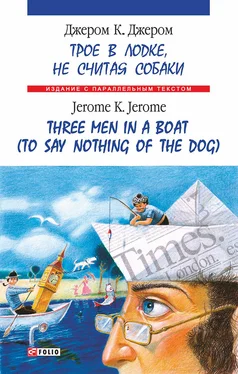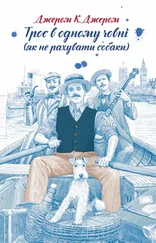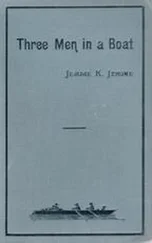Джером Клапка Джером
Троє в одному човні. Three Men in a Boat
The chief beauty of this book lies not so much in its literary style, or in the extent and usefulness of the information it conveys, as in its simple truthfulness. Its pages form the record of events that really happened. All that has been done is to colour them; and, for this, no extra charge has been made. George and Harris and Montmorency are not poetic ideals, but things of flesh and blood – especially George, who weighs about twelve stone. Other works may excel this in depth of thought and knowledge of human nature: other books may rival it in originality and size; but, for hopeless and incurable veracity, nothing yet discovered can surpass it. This, more than all its other charms, will, it is felt, make the volume precious in the eye of the earnest reader; and will lend additional weight to the lesson that the story teaches.
London, August, 1889.
Головна принада цієї книжки не стільки в літературному стилі чи повноті й корисності відомостей, що містяться в ній, скільки в її щирій правдивості. Її сторінки – це звіт про події, що відбувались насправді. Я лише трішечки прикрасив їх і не прошу за це доплати. Джордж, Гарріс і Монтморенсі – не ідеальні витвори поетичної фантазії, а істоти цілком матеріальні, особливо Джордж, що важить близько ста сімдесяти фунтів. Мабуть, інші книжки перевершують цю глибиною думки і знанням людської природи; інші книжки можуть змагатися з нею за оригінальністю й обсягом; але щодо безнадійної, невиліковної правдивості жоден з відомих досі творів не зрівняється з нею. І я гадаю, що з усіх її принад саме ця зробить книжку неоціненною для вдумливого читача й додасть іще більшої ваги тій науці, яку з неї можна здобути.
Лондон, серпень 1889 року.
Three Invalids – Sufferings of George and Harris – A victim to one hundred and seven fatal maladies – Useful prescriptions – Cure for liver complaint in children – We agree that we are over-worked, and need rest – A week on the rolling deep? – George suggests the River – Montmorency lodges an objection – Original motion carried by majority of three to one.
There were four of us – George, and William Samuel Harris, and myself, and Montmorency. We were sitting in my room, smoking, and talking about how bad we were – bad from a medical point of view I mean, of course.
We were all feeling seedy, and we were getting quite nervous about it. Harris said he felt such extraordinary fits of giddiness come over him at times, that he hardly knew what he was doing; and then George said that he had fits of giddiness too, and hardly knew what he was doing. With me, it was my liver that was out of order. I knew it was my liver that was out of order, because I had just been reading a patent liver-pill circular, in which were detailed the various symptoms by which a man could tell when his liver was out of order. I had them all.
It is a most extraordinary thing, but I never read a patent medicine advertisement without being impelled to the conclusion that I am suffering from the particular disease therein dealt with in its most virulent form. The diagnosis seems in every case to correspond exactly with all the sensations that I have ever felt.
I remember going to the British Museum one day to read up the treatment for some slight ailment of which I had a touch – hay fever, I fancy it was. I got down the book, and read all I came to read; and then, in an unthinking moment, I idly turned the leaves, and began to indolently study diseases, generally. I forget which was the first distemper I plunged into – some fearful, devastating scourge, I know – and, before I had glanced half down the list of “premonitory symptoms,” it was borne in upon me that I had fairly got it.
I sat for a while frozen with horror; and then in the listlessness of despair, I again turned over the pages. I came to typhoid fever – read the symptoms – discovered that I had typhoid fever, must have had it for months without knowing it – wondered what else I had got; turned up St. Vitus’s Dance – found, as I expected, that I had that too – began to get interested in my case, and determined to sift it to the bottom, and so started alphabetically – read up ague, and learnt that I was sickening for it, and that the acute stage would commence in about another fortnight. Bright’s disease, I was relieved to find, I had only in a modified form, and, so far as that was concerned, I might live for years. Cholera I had, with severe complications; and diphtheria I seemed to have been born with. I plodded conscientiously through the twenty-six letters, and the only malady I could conclude I had not got was housemaid’s knee.
I felt rather hurt about this at first; it seemed somehow to be a sort of slight. Why hadn’t I got housemaid’s knee? Why this invidious reservation? After a while, however, less grasping feelings prevailed. I reflected that I had every other known malady in the pharmacology, and I grew less selfish, and determined to do without housemaid’s knee. Gout, in its most malignant stage, it would appear, had seized me without my being aware of it; and zymosis I had evidently been suffering with from boyhood. There were no more diseases after zymosis, so I concluded there was nothing else the matter with me.
I sat and pondered. I thought what an interesting case I must be from a medical point of view, what an acquisition I should be to a class! Students would have no need to “walk the hospitals” if they had me. I was a hospital in myself. All they need do would be to walk round me, and, after that, take their diploma.
Then I wondered how long I had to live. I tried to examine myself. I felt my pulse. I could not at first feel any pulse at all. Then, all of a sudden, it seemed to start off. I pulled out my watch and timed it. I made it a hundred and forty-seven to the minute. I tried to feel my heart. I could not feel my heart. It had stopped beating. I have since been induced to come to the opinion that it must have been there all the time, and must have been beating, but I cannot account for it. I patted myself all over my front, from what I call my waist up to my head, and I went a bit round each side, and a little way up the back. But I could not feel or hear anything. I tried to look at my tongue. I stuck it out as far as ever it would go, and I shut one eye, and tried to examine it with the other. I could only see the tip, and the only thing that I could gain from that was to feel more certain than before that I had scarlet fever.
I had walked into that reading-room a happy, healthy man. I crawled out a decrepit wreck.
I went to my medical man. He is an old chum of mine, and feels my pulse, and looks at my tongue, and talks about the weather, all for nothing, when I fancy I’m ill; so I thought I would do him a good turn by going to him now. “What a doctor wants,” I said, “is practice. He shall have me. He will get more practice out of me than out of seventeen hundred of your ordinary, commonplace patients, with only one or two diseases each.” So I went straight up and saw him, and he said:
Читать дальше



![Джером Джером - Троє в одному човні (як не рахувати собаки) [збірка]](/books/173712/dzherom-dzherom-troЄ-v-odnomu-chovnІ-yak-ne-rahuvati-thumb.webp)







![Helen Rowland - The Widow [To Say Nothing of the Man]](/books/752764/helen-rowland-the-widow-to-say-nothing-of-the-man-thumb.webp)